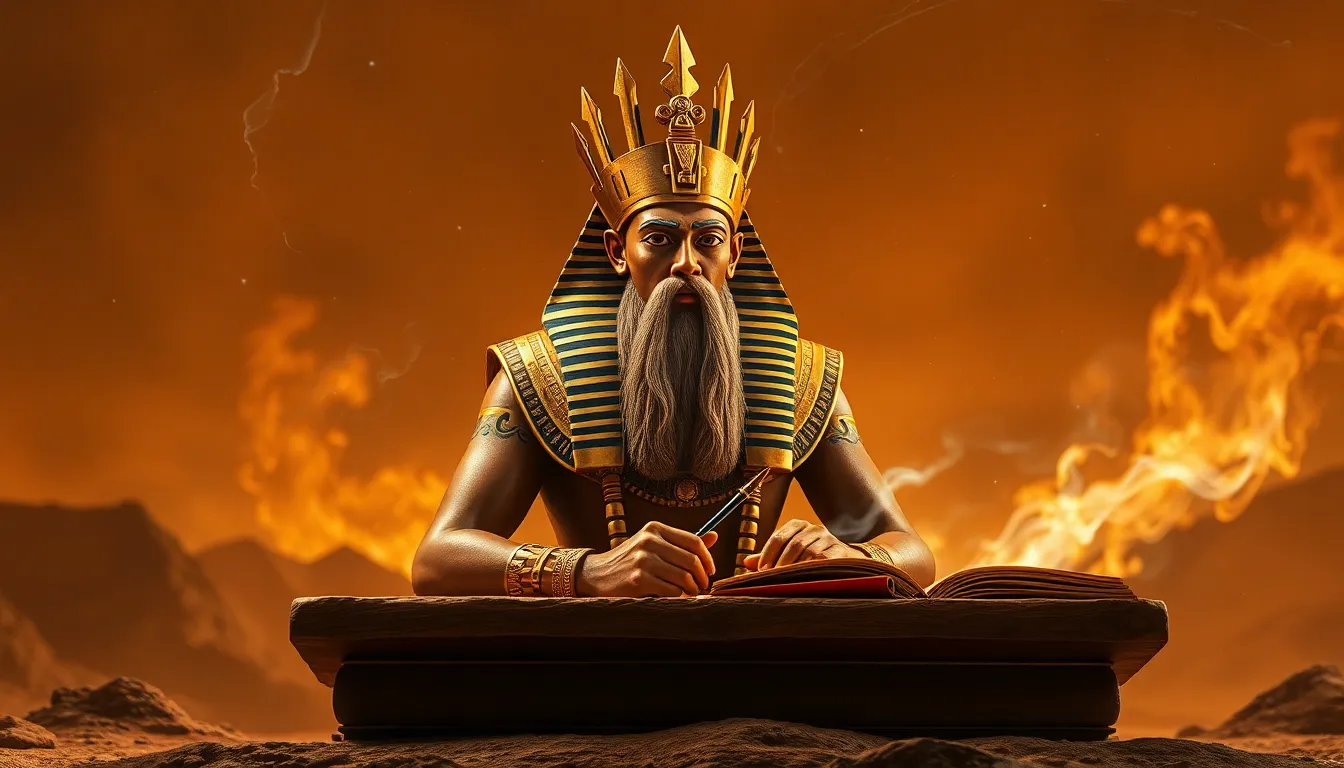The Role of the God Thoth in Wisdom and Writing
I. Introduction
Thoth, one of the most revered deities in ancient Egyptian mythology, is often associated with wisdom, writing, and the moon. His significance transcends mere myth, embodying the cultural values of knowledge and enlightenment that were crucial to the ancient Egyptian civilization. In a world where communication and understanding were vital for survival, Thoth represented the divine aspect of these human endeavors.
The importance of wisdom and writing in ancient cultures cannot be overstated. Writing served as a tool for record-keeping, storytelling, and the transmission of knowledge, while wisdom guided decision-making and governance. This article aims to explore the multifaceted role of Thoth, examining his influence on wisdom and writing and how these elements shaped ancient Egyptian society.
II. Historical Context of Thoth
Thoth’s origins can be traced back to the early dynastic period of ancient Egypt, where he was worshipped as a god of wisdom and the moon. He was often depicted as an ibis or a baboon, animals that symbolized intelligence and eloquence. Thoth was believed to have created writing, thus cementing his role as a patron of scribes and scholars.
As a lunar deity, Thoth was also associated with the passage of time and the calendar. The Egyptians relied on the moon’s phases for agricultural planning and religious festivals, making Thoth an essential figure in their cosmology. In the Egyptian pantheon, Thoth held a unique position as a mediator and advisor among the gods, often intervening in disputes and preserving cosmic order.
III. Thoth as the God of Wisdom
In Egyptian culture, wisdom and knowledge were regarded as divine gifts. Thoth epitomized these qualities, symbolizing the intellectual pursuit and ethical reasoning necessary for a harmonious society. He was often referred to by epithets such as “The Great Scribe,” “Lord of the Words of Power,” and “Master of the Divine Books,” underscoring his association with knowledge and literacy.
Thoth’s influence extended to decision-making and justice, where he was considered a counselor to the gods. His wisdom was sought in matters of governance, law, and moral judgment. The ancient Egyptians believed that Thoth provided the guidance necessary for rulers to make fair and just decisions.
IV. Thoth as the God of Writing
Thoth is credited with the invention of writing, specifically hieroglyphs, which became the cornerstone of Egyptian communication. This invention was not merely a practical tool; it was viewed as a divine gift that enabled humanity to record history, express thoughts, and share knowledge.
His role in recording history and sacred texts was paramount. Thoth was believed to have inscribed the outcomes of the judgment of the dead, ensuring that the deeds of individuals were accurately recorded for the afterlife. The significance of writing in preserving knowledge cannot be overstated, as it allowed the ancient Egyptians to document their culture, religion, and achievements for future generations.
V. Thoth in Mythology and Literature
Thoth appears in numerous stories and myths, often depicted as a wise and knowledgeable deity. One of the most notable myths involves the creation of the world, where Thoth played a vital role in organizing chaos into order. His interactions with other deities, especially Ma’at, the goddess of truth and justice, highlight his importance in maintaining cosmic balance.
Thoth’s contributions to the “Book of the Dead,” a collection of spells intended to assist the dead in the afterlife, further exemplify his significance. He was responsible for recording the results of the weighing of the heart ceremony, where the deceased’s heart was measured against the feather of Ma’at to determine their fate in the afterlife.
VI. Thoth’s Legacy in Modern Culture
Thoth’s influence extends beyond ancient Egypt, permeating contemporary representations of wisdom and writing. In modern spiritual practices, Thoth is often invoked as a symbol of knowledge and insight, with many seeking to emulate his attributes in their personal and professional lives.
In literature, art, and popular media, Thoth’s image endures. He appears in various forms, from fantasy novels to video games, symbolizing the timeless quest for knowledge and understanding. His legacy serves as a reminder of the value of wisdom in navigating the complexities of life.
VII. Comparative Analysis with Other Deities
When examining Thoth alongside other gods of wisdom, such as Athena from Greek mythology and Odin from Norse mythology, several similarities and differences emerge. Like Thoth, Athena is revered for her wisdom and strategic warfare, often depicted with symbols of knowledge such as the owl. Odin, associated with knowledge and poetry, also sacrificed for wisdom, showing a deep cultural reverence for the pursuit of understanding.
However, cultural perceptions of knowledge and writing vary significantly. While Thoth represents a harmonious balance of wisdom and writing, other cultures may emphasize different aspects. For instance, Athena is often portrayed as a warrior goddess whose wisdom is linked to victory and strategy, while Odin’s knowledge often comes at a personal cost.
Thoth’s unique character and role as a mediator in Egyptian mythology distinguish him from his counterparts, highlighting the specific cultural values of ancient Egypt regarding wisdom and writing.
VIII. Conclusion
In summary, Thoth’s impact on wisdom and writing is profound, reflecting the ancient Egyptians’ reverence for knowledge as a guiding principle of life. His legacy continues to resonate in modern society, where the pursuit of wisdom remains a vital endeavor. As we reflect on Thoth’s role in shaping ancient culture, we are reminded of the enduring importance of knowledge, not only in the past but also in navigating the complexities of our contemporary world.
Thoth serves as a timeless symbol of the quest for understanding, illustrating that the pursuit of wisdom is a fundamental aspect of the human experience.




